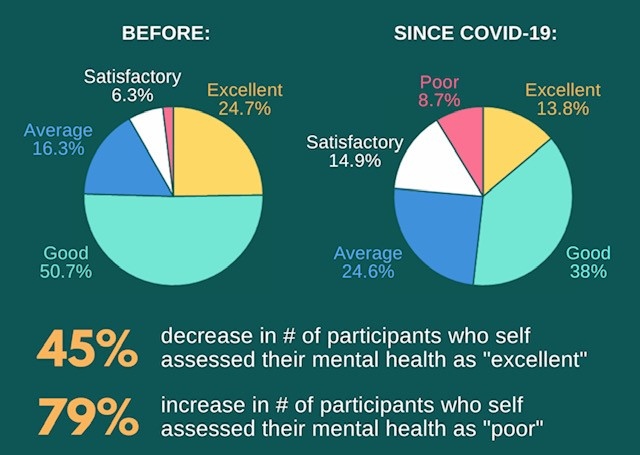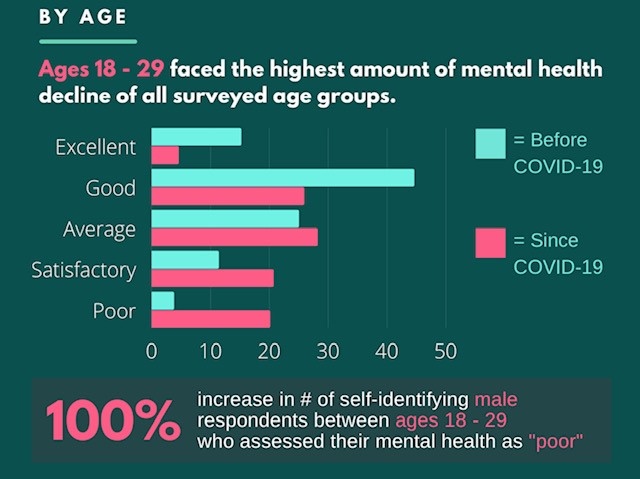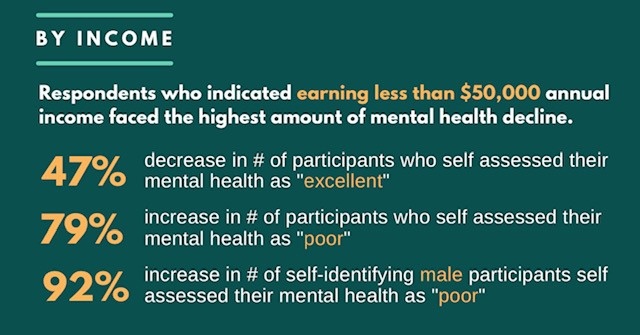Mental health much worse in rural Ontario since COVID pandemic, research shows
No one enjoyed being a part of the COVID-19 pandemic, but new research shows it hit people hard in Huron and Perth County.
“Our research is very telling. I mean, it’s not surprising. We’ve seen mental health issues have increased, substance use has increased. People are struggling,” says Grace Bonnett, from the Gateway Centre of Excellence in Rural Health.
New research unveiled Thursday in Mitchell, and commissioned by Huron County’s Gateway Centre of Excellence in Rural Health, shows the toll COVID-19 played on people’s mental health.
Of 3,600 respondents interviewed before and since the pandemic’s arrival, there was a 79 per cent increase in the number of people rating their mental health as “poor.”
 Findings from research into mental health in Huron and Perth counties, pre and post COVID, by Gateway Centre for Excellence in Rural Health. (Courtesy: Leith Deacon and Sampoorna Bhattancaryn and Gateway Centre of Excellence in Rural Health)
Findings from research into mental health in Huron and Perth counties, pre and post COVID, by Gateway Centre for Excellence in Rural Health. (Courtesy: Leith Deacon and Sampoorna Bhattancaryn and Gateway Centre of Excellence in Rural Health)
 Findings from research into mental health in Huron and Perth counties, pre and post COVID, by Gateway Centre for Excellence in Rural Health. (Courtesy: Leith Deacon and Sampoorna Bhattancaryn and Gateway Centre of Excellence in Rural Health)
Findings from research into mental health in Huron and Perth counties, pre and post COVID, by Gateway Centre for Excellence in Rural Health. (Courtesy: Leith Deacon and Sampoorna Bhattancaryn and Gateway Centre of Excellence in Rural Health)
 Findings from research into mental health in Huron and Perth counties, pre and post COVID, by Gateway Centre for Excellence in Rural Health. (Courtesy: Leith Deacon and Sampoorna Bhattancaryn and Gateway Centre of Excellence in Rural Health)
Findings from research into mental health in Huron and Perth counties, pre and post COVID, by Gateway Centre for Excellence in Rural Health. (Courtesy: Leith Deacon and Sampoorna Bhattancaryn and Gateway Centre of Excellence in Rural Health)
Young men seemed to take it the hardest, reporting a 100 per cent increase of 18-29 year olds rating their mental health as “poor.” Men earning less than $50,000 saw a 92 per cent increase in the number of participants rating their mental health as “poor.”
“Suicide is the leading cause of death for males in rural spaces, and there is this long standing attitude, as a male especially, to grin and bear it. Don’t cry. Well, that’s sort of ridiculous,” says the study’s lead researcher, University of Guelph associate professor in rural planning and development, Leith Deacon.
And although there were more mental health resources available during the pandemic, few people knew how or where to go for help.
“The reality is people do not know where to go for support for mental health, unless they’ve already accessed the system,” says Deacon.
“You almost had to know somebody who was working in mental health and wellness, to get in,” says Casandra Bryant, PhD researcher with the University of Guelph, who helped in research for the report.
At today’s Solutions Conference, presenting the mental health research report, there was a recommendation to find mental health system navigators, or wellness experts, to help.
“Our goal for this project is to not let this research sit on a shelf. We want to take this and act on it, and do something with it,” says Bonnett.
To learn more, you can visit www.gatewayruralhealth.ca information sheets from the research project are also available here.
CTVNews.ca Top Stories

BREAKING Trump picks former congressman Pete Hoekstra to be ambassador to Canada
U.S. president-elect Donald Trump said on Wednesday he was picking former congressman Pete Hoekstra to be the U.S. ambassador to Canada.
Genetic evidence backs up COVID-19 origin theory that pandemic started in seafood market
A group of researchers say they have more evidence to suggest the COVID-19 pandemic started in a Chinese seafood market where it spread from infected animals to humans. The evidence is laid out in a recent study published in Cell, a scientific journal, nearly five years after the first known COVID-19 outbreak.
This is how much money you need to make to buy a house in Canada's largest cities
The average salary needed to buy a home keeps inching down in cities across Canada, according to the latest data.
'My two daughters were sleeping': London Ont. family in shock after their home riddled with gunfire
A London father and son they’re shocked and confused after their home was riddled with bullets while young children were sleeping inside.
Smuggler arrested with 300 tarantulas strapped to his body
Police in Peru have arrested a man caught trying to leave the country with 320 tarantulas, 110 centipedes and nine bullet ants strapped to his body.
Boissonnault out of cabinet to 'focus on clearing the allegations,' Trudeau announces
Prime Minister Justin Trudeau has announced embattled minister Randy Boissonnault is out of cabinet.
Baby dies after being reported missing in midtown Toronto: police
A four-month-old baby is dead after what Toronto police are calling a “suspicious incident” at a Toronto Community Housing building in the city’s midtown area on Wednesday afternoon.
Sask. woman who refused to provide breath sample did not break the law, court finds
A Saskatchewan woman who refused to provide a breath sample after being stopped by police in Regina did not break the law – as the officer's request was deemed not lawful given the circumstances.
Parole board reverses decision and will allow families of Paul Bernardo's victims to attend upcoming parole hearing in person
The families of the victims of Paul Bernardo will be allowed to attend the serial killer’s upcoming parole hearing in person, the Parole Board of Canada (PBC) says.


































